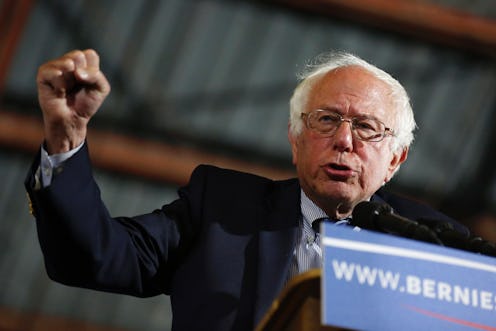News
Sanders' Superdelegate Strategy Gains Momentum
Superdelegates have been one of several topics of heated debate in the 2016 Democratic primaries. Early on in the race, some of Sen. Bernie Sanders' supporters feared that they might help Hillary Clinton win the nomination over Sanders even if he got more of the popular vote. Although Clinton won the majority of bound delegates in the end, Sanders still says he wants to eliminate superdelegates. And he may have enough support from Democratic officeholders to make that happen, or at least to reduce their number.
Superdelegates are Democratic Party VIPs, including current officeholders, who can cast their vote for any candidate at the National Convention, regardless of how people voted in the primaries. They comprise about 15 percent of the total number of delegates the party offers in 2016.
Politico interviewed almost 20 Democratic senators, and found a surprising amount of support for either abolishing or reforming the superdelegate system. Some of them have endorsed Clinton, including Elizabeth Warren and Tim Kaine, both of whom Clinton floated as potential vice president picks. More than half of those interviewed said they think the number of superdelegates should at least be reduced, and only two were against the issue being debated at the convention in July, where party rules will be set.
The superdelegate system exists so that those most engaged in the Democratic Party can have some measure of control over who the nominee is, since this enables them to select the candidate most likely to win in November, in case primary voters end up choosing someone with less of a chance (*cough* Donald Trump *cough*). In a bizarre shift in the middle of the primaries, Sanders actually suggested he would try to flip superdelegates to his side even if he lost the popular vote, arguing that he'd be stronger against Trump in the general election than Clinton.
But with the final primaries completed, Sanders has gone back to his original position. And though some expressed agreement with the Vermont senator, others oppose the idea. Sen. Chuck Schumer, for example, defended the current setup as a way of ensuring that people who have long-time experience working in the party have a special role in the nomination process.
The Congressional Black Caucus is also against any attempt to change the current system. In a letter to Clinton, Sanders, Democratic National Committee Chair Debbie Wasserman Schultz, House Minority Leader Nancy Pelosi, and Senate Minority Leader Harry Reid, the Caucus said that eliminating the delegate status of officeholders would force those who wish to serve as delegates to run for slots against their own constituents. However, this concern could be addressed by allowing officeholders to maintain their delegate status while binding their votes to primary results.
The pressure is on the Democratic Party and Clinton to keep Sanders supporters on board. They're calling for the end of superdelegates, and if a substantial number of these superdelegates either oppose their own special status or support reducing the number of unbound votes at future conventions, we have reason to expect future Democratic primaries to be different.
